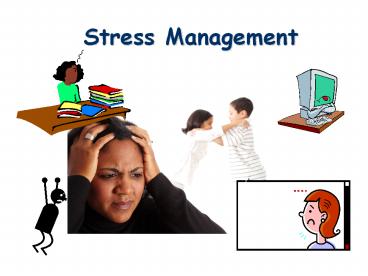WHAT IS STRESS - PowerPoint PPT Presentation
1 / 19
Title:
WHAT IS STRESS
Description:
Stress Management Every day, if you can enjoy one delicious moment, one beautiful moment, and one funny moment, you will soon recognize a meaningful life is no ... – PowerPoint PPT presentation
Number of Views:71
Avg rating:3.0/5.0
Title: WHAT IS STRESS
1
Stress Management
2
- Every day, if you can enjoy one delicious
moment, one beautiful moment, and one funny
moment, you will soon recognize a meaningful life
is no further away than a box of chocolates on
your desk, the street musician on your walk to
school, and a little heartwarming (or
sidesplitting) laughter. - - David Romanelis
3
WHAT IS STRESS?
- Stress is your mind and bodys response or
reaction to a real or imagined threat, event, or
change. - The threat, event, or change are commonly called
stressors. - Stressors can be
- Internal thoughts, beliefs, attitudes or
- External loss, tragedy, change
OMG!!!
4
LEVELS OF STRESS
5
EUSTRESS
- Eustress, or positive stress, occurs when your
level of stress is high enough to motivate you to
move into action to get things accomplished.
6
DISTRESS
- Distress, or negative stress, occurs when your
level of stress is either too high or too low and
your body and/or mind begin to respond negatively
to the stressors.
7
STAGES OF STRESS
8
ALARM STAGE
- As you begin to experience a stressful event, or
perceive something to be stressful, physiological
changes occur in your body. This experience, or
perception, disrupts your bodys normal balance
and immediately your body begins to respond to
the stressor(s) as effectively as possible.
9
EXAMPLES
- Cardiac - increased heart rate
- Respiratory - increased respiration
- Skin - decreased temperature
- Hormonal - increased stimulation of adrenal genes
which produce an adrenal rush.
10
RESISTANCE STAGE
- During this stage, your body tries to cope or
adapt to the stressors by beginning a process of
repairing any damage the stressor has caused.
Your friends, family, or co-workers may notice
changes in you before you do, so it is important
to examine their feedback to make sure you do
not reach overload.
11
RESISTANCE STAGE EXAMPLES
- Behavior indicators include
- Lack of enthusiasm for family, school,
work, or life in general - Withdrawal
- Change in eating habits
- Insomnia or hypersomnia
- Anger
- Fatigue
12
RESISTANCE STAGE EXAMPLES
- Cognitive indicators include
- Poor problem solving
- Confusion
- Nightmares
- Hyper-vigilance
13
RESISTANCE STAGEMORE EXAMPLES
- Emotional indicators include
- Tearfulness
- Fear
- Anxiety
- Panic
- Guilt
- Agitation
- Depression
- Overwhelmed
14
EXHAUSTION STAGE
- During this stage, the stressor is not being
managed effectively and the body and mind are not
able to repair the damage.
15
EXAMPLES
- Digestive disorders
- Withdrawal
- Headaches
- Tension
- Insomnia
- Loss of temper
16
STUDENT STRESS RATING SCALE
- The following are events that occur in the life
of a student. Place a check in the left-hand
column for each of those events that has happened
to you during the last 12 months. - ___ Death of a close family member - 100 points
- ____ Jail term - 80 points
- ____ Final year or first year in college - 63
points - ____ Pregnancy (to you or caused by your) - 60
points - ____ Severe personal illness or injury - 53
points - ____ Marriage - 50 points
- ____ Any interpersonal problems - 45 points
- ____ Financial difficulties - 40 points
- ____ Death of a close friend - 40 points
- ____ Arguments with your roommate (more than
every other day) - 40 points - ____ Major disagreements with your family - 40
points - ____ Major change in personal habits - 30 points
- ____ Change in living environment - 30 points
- ____ Beginning or ending a job - 30 points
- ____Problems with your boss or professor - 25
points - ____ Outstanding personal achievement - 25 points
- ____ Failure in some course - 25 points
- ____ Final exams - 20 points
17
INTERPRETING YOUR SCORE
- Less than 150 points relatively low stress
level in relation to life events - 150 - 300 points borderline range
- Greater than 300 points high stress in relation
to life events - Note From Girdano, D.A., Everly, G. S., Jr.,
Dusek, D. E. (1990). Controlling stress and
tension (3rd edition), ENnglewood Cliffs, NJ
Prentice Hall.
18
IM IN CONTROL - DISTRESS RELIEF STRATEGIES
Feeling good about yourselves can be an effective
buffer against stress and help eliminate
unnecessary worries. Most worries are either
passed on to us by another, or conjured up in our
imagination.
- GET PHYSICAL
- Relax neck and shoulders
- Take a stretch
- Get a massage
- Exercise
- GET MENTAL
- Count to 10
- Control your thoughts
- Fantasize
- Congratulate yourself
- Ignore the problem if appropriate, after
evaluation - Perform self maintenance
- Talk to a counselor
- GET SPIRITUAL
- Meditate
- Pray
- Remember your purpose
- USE YOUR BODY AND MIND TOGETHER
- Take a break
- Get hug therapy
- Try progressive relaxation
- Try yoga
- Try aroma therapy
- Laugh
- DEVELOP NEW SKILLS
- Prioritize daily tasks
- Learn something
- Practice a hobby
19
MORE STRATEGIES
- What is Stress Web Site. http//www.teachhealth.c
om - How to reduce and relieve stress Web Site.
http//www.family.com - Stress Relievers Web Site. http//www.residentas
sistant.com - Massage Downing, G. (1972). Massage Book.
New York Random House. - Aromatherapy Web Site. http//www/aromaweb.c
om/articles/wharoma.as - Yoga Web Site. http//www.kevala.co.uk/yoga/over
view.htr































